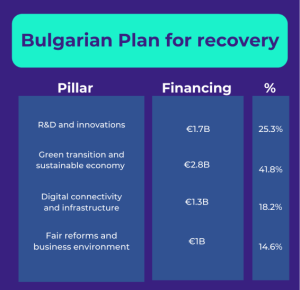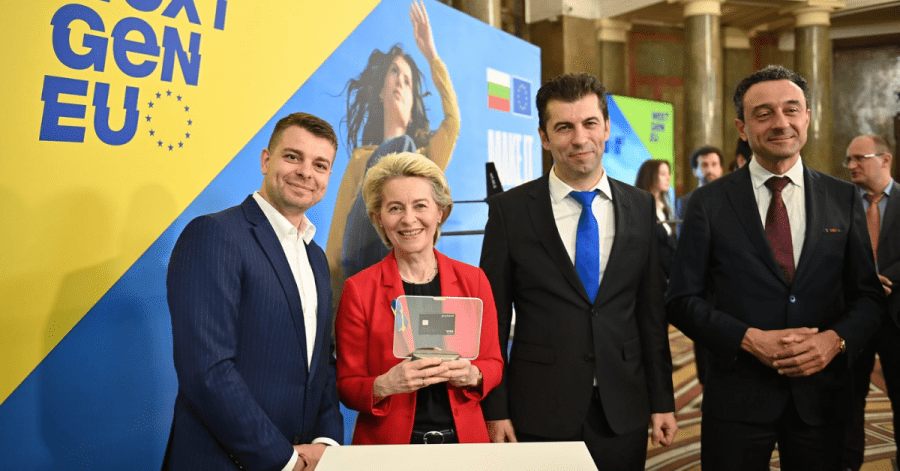Almost a year and a half after the Bulgarian caretaker government presented the first National Recovery and Resilience Plan in October 2020, yesterday the sixth version of the plan, updated by the Cabinet of Prime Minister Kiril Petkov, received official approval from the European Commission. The plan, which is part of the NextGenerationEU program and is about to be voted on by the European Council, foresees the allocation of €6.3B in the form of grants toward the sustainable development and recovery of Bulgaria.
In the next four years, the grants will be used for the implementation of 47 policy reforms and 53 projects in four main fields – green and digital transition, social initiatives, education, and healthcare. The plan prioritizes climate change and green transition goals, for which the government anticipates allocating around 60% of the grants, which equals to €3.7B.
Ursula von der Leyen, the President of the European Commission, arrived in Sofia to give a formal presentation of the European Commission’s assessment of the National Plan for Reconstruction and Sustainability of Bulgaria. During her visit, she met with Prime Minister Kiril Petkov and representatives of the Bulgarian startup ecosystem including Hristo Borisov, founder and CEO of Payhawk, Svilen and Konstantin Rangelov, co-founders of Dronamics, and Raycho Raychev, founder of EnduroSat. Ursula von der Leyen also met with representatives of the Institute for Computer Science, Artificial Intelligence and Technology (INSAIT), part of the Sofia University in collaboration with ETH Zurich and EPFL Lausanne.
How is innovation covered in the Plan?
“The innovation fields where we will put most emphasis are green transition, energy, digitalization of government services, and companies infrastructure. There will be a certain focus on cybersecurity, for obvious reasons, and we will aim to help companies improve their cybersecurity and technological infrastructure. This summer, we are also going to revive the National Innovation Fund, which sponsors Bulgarian companies to acquire research services from academic institutions so they can improve the intellectual property of their products. And later on, we would also sponsor academic institutions to create spin-offs. I dare say we also have a small dream about the first Bulgarian space program,” Daniel Lorer, Minister of Innovation and Growth, shared for The Recursive. Stay tuned for more insights from the innovation minister in our upcoming interview.
5G, digital skills and cybersecurity
The government wants to spend €1.6B, which is a quarter of the total sum of the Recovery Plan to improve digitalization and connectivity, as well as to develop a 5G network and more efficient use of the radio spectrum. The business and innovation environment will be supported with around €700M which will come in the form of grants for technological modernizations, ICT and cybersecurity, and circular economy. Around €319M is planned to be spent on the development of digital skills, while €297M will be invested in the digitalization of the administration. In addition, €270M is planned to be invested in the creation of a high-speed internet network in remote and sparsely populated regions.

As of now the government has decided not to take advantage of the opportunity to take loans with preferential terms from the European Union to accelerate the economic recovery. In order to appropriate all the reserved money, Bulgaria has to implement the planned projects by the end of 2026. The projects which are not completed on time will lose the financing. The Bulgarian Recovery and Resilience Plan is the 23rd plan that received the Commission’s approval. The remaining three member states which have not received approval are Hungary, Poland, and the Netherlands.







